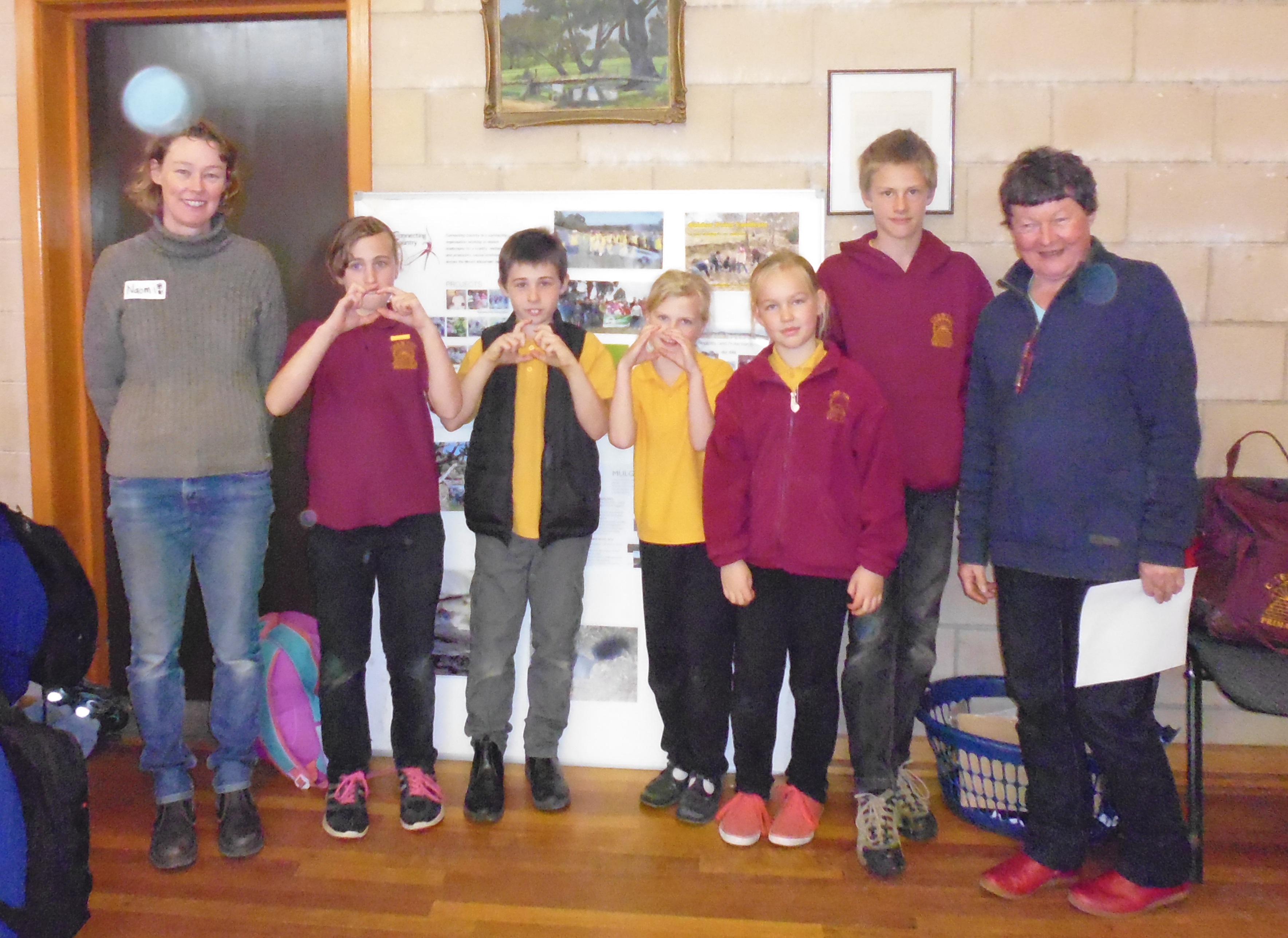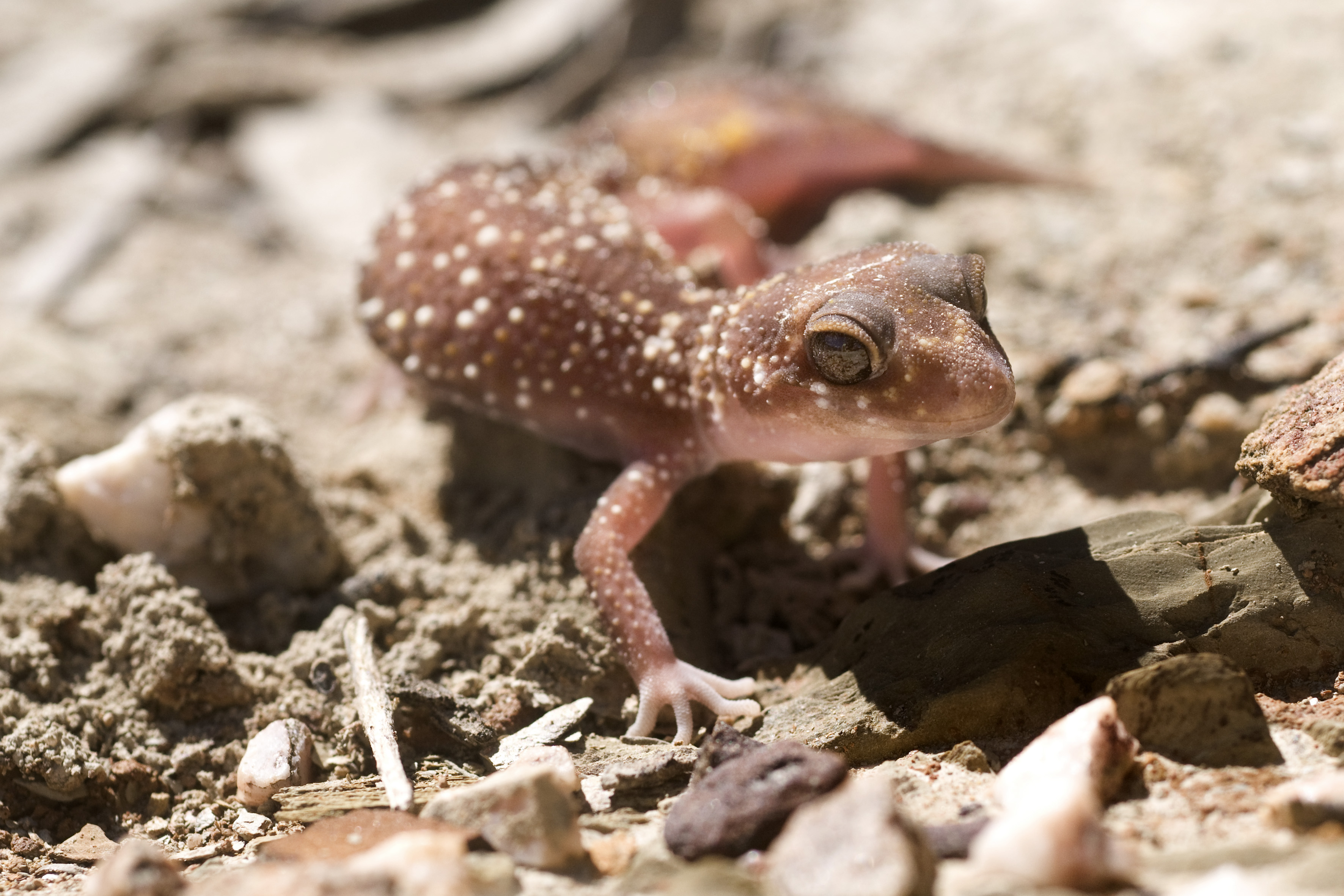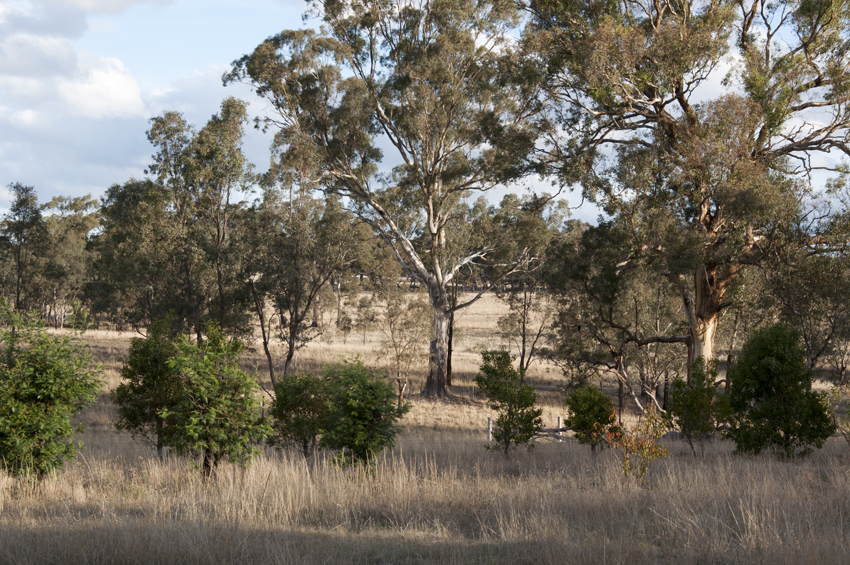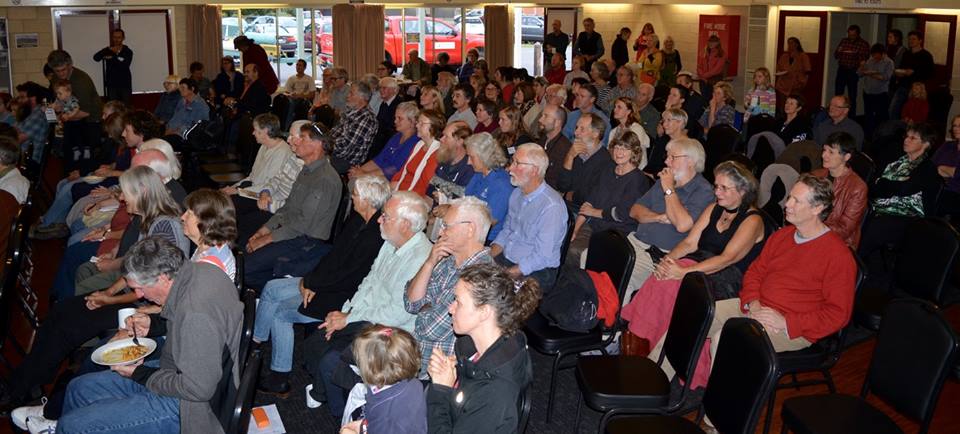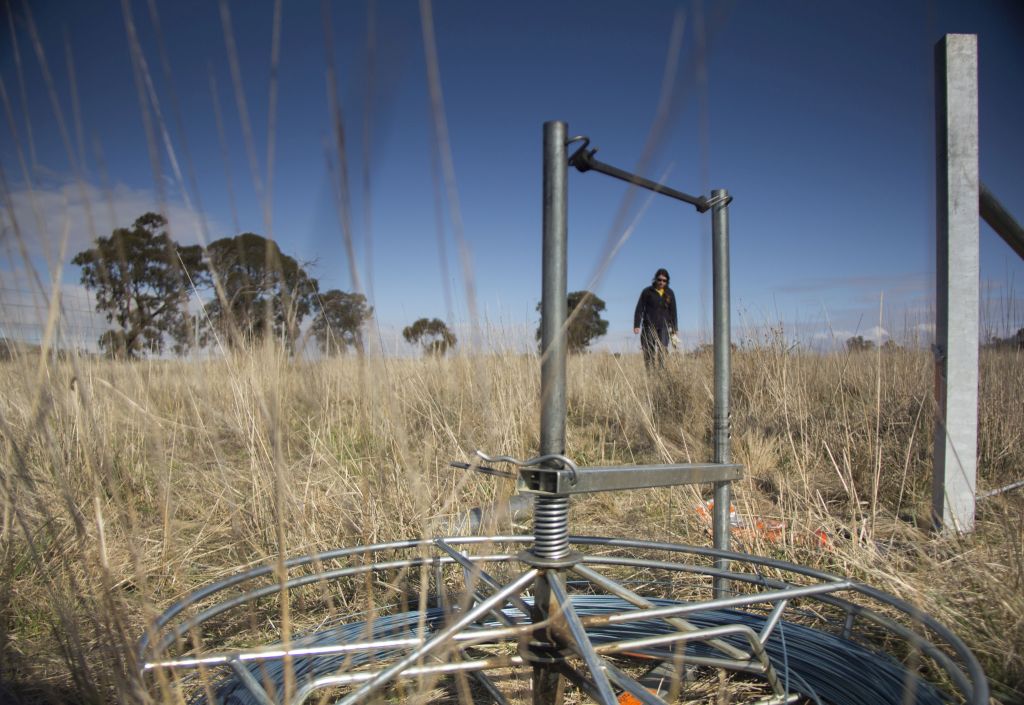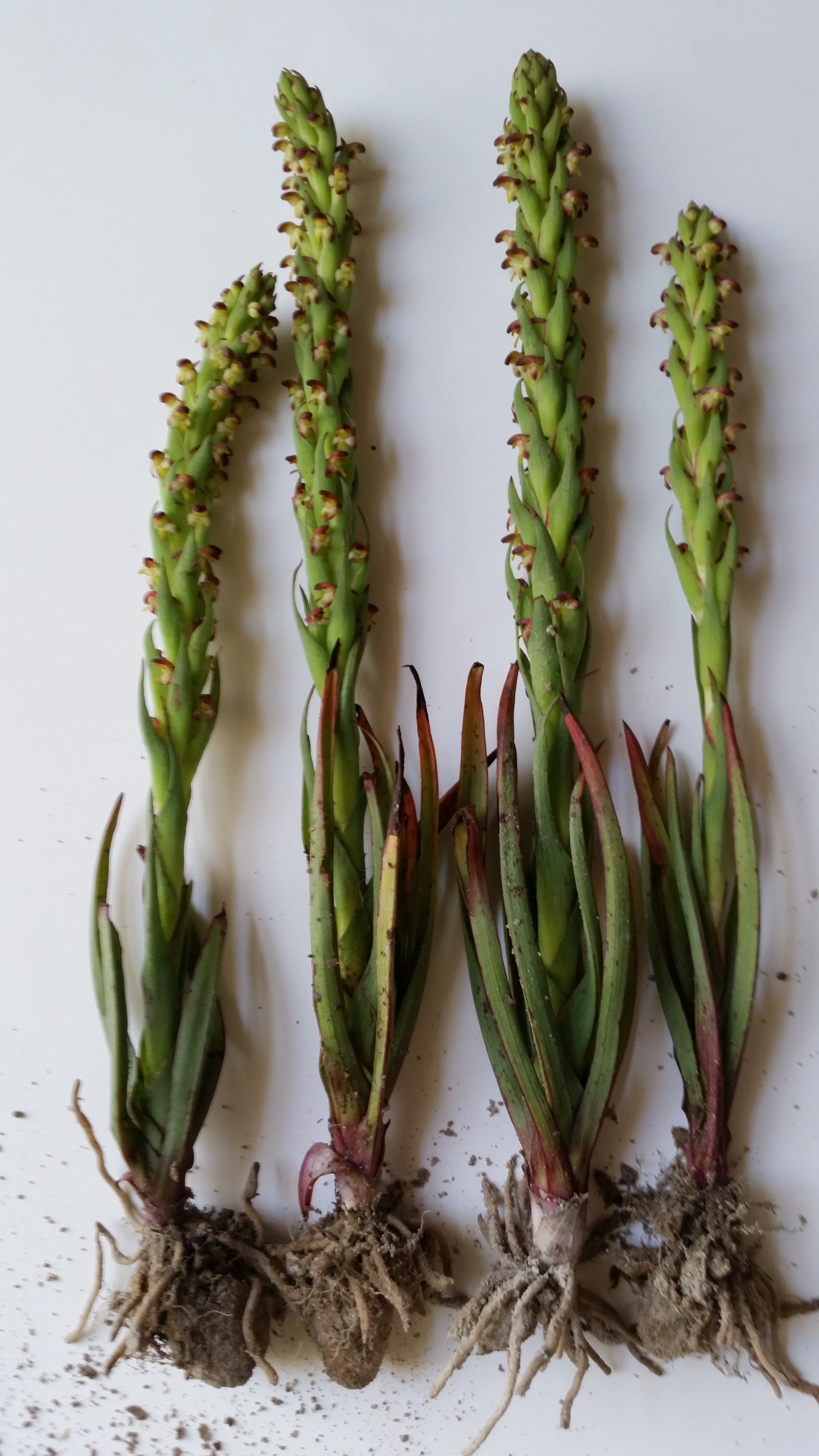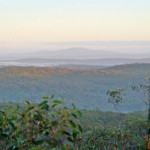2016 Works Crew – a big thank-you to all!
Posted on 14 December, 2016 by Connecting Country
Creating change on-ground is an essential part of what we do at Connecting Country. This year, we have worked with over 30 private landholders and groups to develop and implement projects that improve and connect habitat in the region. At the same time, we have provided natural resource management training to a crew who do our on-ground work.
Our annual works crew has seen a number of people involved this year and we’d like to thank them all for their effort and hard work. The crew started just after Easter with Alex Schipperen as crew leader and Anna Pike, Rachel Campbell and Luke Archer as crew members.

2016 Works Crew (L-R); Luke Archer, Rachel Campbell, Anna Pike and Alex Schipperen (crew leader).
Together, they fenced off remnant vegetation and creek lines, undertook weed and pest animal control and planted lots of plants. They learnt to cut and paint woody weeds and drill and fill pines while also receiving training and tickets in spraying and chainsaw use.
Rachel and Alex moved onto other positions about midyear and this made way for some fresh faces. Fritz Hammersly stepped into the role of crew-leader and Scott Woodman joined the crew. More recently, Anna left the crew as she gained employment with the summer fire crew.

2016 Works Crew following their thank-you breaky in Newstead last week. (L-R) Scott Woodman, Luke Archer and Fritz Hammersly
Connecting Country is proud to give this training and work opportunity to the young people in our area. When asked what his favourite part of being on the crew was, Luke replied “just being outside”.
Best wishes and thank-you to all from Connecting Country.
15th December 2016 – Monster Meeting of Miners celebration in Chewton
Posted on 12 December, 2016 by Connecting Country

Michael Smith recently walked from Chewton to Canberra to present to the Federal Parliament a bill about war powers in Australia.
The Chewton Domain Society have asked Connecting Country to share news of their annual celebration of the 1851 Monster Meeting of Miners at the original site at Golden Point Rd Chewton on the 15th December 2016. They will tell and sing the story of how the Diggers on the Forest Creek Goldfields set a path to democracy when they stood up to Governor La Trobe’s unfair gold licence fees. At this year’s celebration, author Robyn Annear will deliver a tribute to Connecting Country’s first president, the late Doug Ralph who was also the instigator of the modern celebrations of the Monster Meeting in 1995.
In 2016 there will be two additions to the Monster Meeting celebrations.
Firstly the site at Chewton where 15,000 miners peacefully gathered to defy the government and demand respect for their rights, has now been declared a Site of National Significance in the cultural history of Victoria, and nominated for addition to the Heritage Register.
This recognises that the Monster Meeting was a defining event that united individual gold seekers into a political force that became the Diggers and set a path to popular democracy in Australia. A path that led to miners’ defiance across the Victorian goldfields and culminated, three years later, at the Eureka Stockade.
Secondly, in keeping with the spirit and theme of democracy from the original 1851 meeting, this year the Monster Meeting celebrations will include a guest speaker who will talk about democracy today – in particular the issue of democracy and war.
That speaker is Chewton resident, Michael Smith. Michael recently walked from Chewton to Canberra to present to the Federal Parliament a bill about war powers in Australia. His bill proposes that any decision about whether our country becomes involved in a war should be made by the whole Parliament, not just by the Prime Minister as it is currently.
The MC will be Jan ‘Yarn’ Wositzky who, along with Danny Spooner and Tony Ryan, will be singing songs from the acclaimed Monster Meeting CD, and will pay tribute to one of the songwriters, the late Doug Owen.
CONTACT: For information Pat Healy – 0422 759 661.
Fare-thee-well to 2016 and Merry Christmas from CC staff and committee
Posted on 8 December, 2016 by Connecting Country
2016 has been an exciting year for Connecting Country staff and committee of management. We have been busy helping landholders with on-ground works, supporting landcare, monitoring populations of plants and animals and engaging with our community of amazing supporters, members and volunteers. We are all so proud to have had the opportunity to work with the people and environment across the Mount Alexander region to do all of these activities.
In 2016 we focused on raising the profile of woodland birds and growing our partnerships with fellow organisations. This enabled us to work cooperatively with the Friends of Box Ironbark Forests, North Central Catchment Management Authority, Mount Alexander Shire Council, Dja Dja Wurrung Clans Aboriginal Corporation, Parks Victoria, Castlemaine Festival of Gardens, Castlemaine Agricultural Society and of course lots of our local landholders and volunteers. We would like to thank all involved and our project funders over the last twelve months.
We have also been planning for our future and 2017 promises to be as invigorating. We currently have ten projects on the go and look forward to continue rolling them out into the New Year. We are particularly looking forward to the Camp Out on the Mount event, celebrating the achievements of the the Connecting Landscapes program which concludes in June and a workshop series around Water in our Landscape. Watch this space to find out more!
We have created a snapshot from 2016 events and activities in the gallery below, see if you can see you!
Fine food and owlet-nightjar magic at our December bird walk
Posted on 7 December, 2016 by Tanya Loos
Our last bird outing of 2016 was a little bit different – 17 of us met at Jane Rusden’s bush block at Campbells Creek. After a fairly humid walk, we returned to Jane’s home where she had prepared a incredibly delicious festive morning tea! But let’s talk about birds first – and, in particular, our thrilling sighting of a owlet-nightjar.
Jane and Martin’s property is 40 acres of heathy dry/ valley grassy forest that runs along a gully line. Their property was included in our 2016 Connecting Landscapes on ground works program, with weed and rabbit control, some planting and the erection of a number of exclosures to keep out hungry browsing wallabies. The property is a hotspot for woodland birds such as Australian Owlet-nightjar, Speckled Warbler and Painted Button-quail. In fact, on Monday Jane excitedly contacted us reporting an adult Painted Button-quail with three large chicks!
Our walk on the 4th December 2016 was rather quiet, with only 18 bird species observed over a couple of hours. We travelled up Hawkins Rd into the surrounding Castlemaine National Heritage Diggings Park, and then looped around to walk up the gully on Jane’s block. The highlight was when Greg Waddell called out to our group – an owlet-nightjar had been disturbed by our presence!

After being flushed-out, the owlet-nightjar returned to its cosy hollow in a broken off tree stag. Pic by Peter Turner.
The Australian Owlet-nightjar is a surprisingly small bird, and so special it is in a bird family all on its own! There is just the one species in Australia, and six species in Papua New Guinea. For many of us (including me!) it was the first time we had laid eyes on this enchanting bird.
The owlet-nightjar is considered to be a good indicator of ecosystem health – their penchant for using many small hollows tells us that there are plenty of hollows in that part of the bush.
Despite the forest being reasonably quiet we all had a chance to brush up on our bird calls – with many learning the calls of the Spotted Pardalote and the White-throated Treecreeper for the first time.
As we headed into the gully, some of us observed a Yellow-footed Antechinus – a quick glimpse of this small charismatic native mammal.
After our walk we returned to Jane’s. I was a little late as I had to get some feathered five maps from the car, and as I went up the stairs all I could hear was ecstatic ‘oohs and ahs’ at the food Jane had so kindly prepared!
The feast was our way to thank everyone for their participation on the monthly bird walks, and for sending in their bird sightings. The dairy-free Mango Celebration Cake, Lime Macadamia Balls and Fruit Cake were highlights and those who subscribe to the Bird Survey Enews will get the amazing cake recipe as requested!
Huge thanks to Jane for the feast and inviting us into her home, Greg Waddell for spotting the owlet-nightjar, and Peter Turner for photographing it! Thanks also to the Helen MacPherson Smith Trust who support our Stewards for Woodland Bird program.
Our monthly bird walks will continue in 2017 on the first Sunday of the month. Contact Tanya Loos for more information: tanya@connectingcountry.org.au or phone 5472 1594.
The Mount Alexander Council Plan – have your say!
Posted on 7 December, 2016 by Connecting Country
 What do you love about living in Mount Alexander Shire? What are your aspirations and priorities for the shire over the next four years? The Mount Alexander Shire Council has asked Connecting Country to share the news that they are developing their four year Council Plan. You could help shape the Council Plan by contributing your views and by sharing the opportunity to contribute with your friends and networks.
What do you love about living in Mount Alexander Shire? What are your aspirations and priorities for the shire over the next four years? The Mount Alexander Shire Council has asked Connecting Country to share the news that they are developing their four year Council Plan. You could help shape the Council Plan by contributing your views and by sharing the opportunity to contribute with your friends and networks.
There are a number of ways to get involved in this project. For more information please visit the website.
http://haveyoursay.mountalexander.com.au/council-plan2021
Nature News December 2016 – Lichens: Underrated Natural Wonders
Posted on 7 December, 2016 by Connecting Country
For this month’s Nature News, found on page 38 in this week’s Midland Express (6th December 2016), Bronwyn Silver, nature photographer and co-author of Eucalyptus of the Mount Alexander Region, shares her interest in the natural beauty and wonder of our local lichens.
I was originally attracted to lichens, especially ‘map’ lichens, because they looked so unusual. Map lichens (Rhizcarpon geographicum) come in many colours and often have intricate arrangements due to each lichen being surrounded by a black border and adjacent to another. Many of the rock surfaces tightly encrusted with map lichen look like aerial maps or abstract art works.
Unless you are watching out for this lichen, these subtle and often small formations can easily be overlooked. But once I became aware of their wonderful abstract qualities and sought them out, I found them to be quite common in our bushlands.
Then, when I did more research, I began to find lichens even more fascinating. Although they are sometimes confused with moss, lichens are unrelated to moss or any other plant. In fact, lichen can be regarded as a community rather than a single organism because it always consists of at least one species of alga and one species of fungus that grow together in a mutually beneficial relationship. The fungus provides protection and absorption of minerals and gains nutrients from its photosynthesizing partner in return.

Peppered Rock Shield lichen (Xanthoparmelia conspersa) resting on rock and moss (Triquetrella papillata) Photo: Bronwyn Silver
There are over 3000 known species of lichen in Australia; some are leafy, some are plant-like, and some are flat. Map lichen and other flat types are pretty much the same in all weather conditions. Other lichens are called ‘resurrection’ plants because they can switch off their metabolism and then fire up again when there is moisture.
The greatest threats to lichens are fire and pollution. However, the importance of conserving lichens is generally overlooked despite their many benefits for the environment. Like mosses, they can help with soil stabilization and the colonisation of barren environments. Some animals eat them, insects shelter in them, and people have used them for food, perfume, medicine and dyes. For example, traditionally lichens were used to produce the colours of Harris Tweed.
And very importantly they can enhance our aesthetic appreciation of the bush with their varied colours, unusual shapes and wonderful patterns on the surfaces of rocks, trees, leaves and soil.
If you would like to find out more about lichens a good place to start is the three engaging interviews with Tasmanian lichenologist, Gintaras Kantvilas, available on the ABC Science Show – click here.
Soils workshop with Katie, Hugh and NCCMA
Posted on 1 December, 2016 by Connecting Country
On Wednesday the 30th November 2016, Connecting Country was proud to partner with the North Central Catchment Management Authority (NCCMA) to provide an soils health workshop as a extension to our Farm Field Day held in August. Sixteen attendees were taken through the soils guide which was developed by the NCCMA to help people to conduct tests on their soil to survey for soil health. Katie and Hugh Finlay, from the Mount Alexander Fruit Gardens, kindly hosted the event on their orchard in Harcourt and shared their understanding and land management practices in relation to soil health.
Mandy Coulson (NCCMA) and Martin Hamilton (Department of Agriculture) lead participants through the guide which aims to give landholders a quick and easy group of soil tests they can do on their patch. It’s intended that these results become baseline information for soil health. Katie and Hugh grounded this exercise with the story of land management practice change on their orchard, current practice and resultant soil health.
Connecting Country has copies of the soil guide available from their office at the Hub – feel free to drop by and pick one up. Another great resource for people interested in soils is the The Brown Book website hosted by the Corangamite CMA.
Celebrate International Volunteer Day with MAVN
Posted on 1 December, 2016 by Connecting Country
Connecting Country would like to share Mount Alexander Volunteer Network’s series of morning teas and information sessions to celebrate International Volunteer Day. The session will include resources and opportunities to strengthen volunteer programs across the shire. These events will be a great way to find out more about support for volunteering in our shire and acknowledge the contribution that volunteers make locally.
 On Sunday 4th December 2016, join them for a thank you event at the Castlemaine Farmers Market in Victory Park, between 9am – 11am. Federal MP, Lisa Chesters, will be on hand to express her thanks and local community radio station MAIN FM will be broadcasting live from Victory Park, chatting on-air to volunteers and volunteer involving groups. The Volunteer Network will have thank you cards for community members to sign as a gesture of thanks for local groups and – most importantly – there will be CAKE.
On Sunday 4th December 2016, join them for a thank you event at the Castlemaine Farmers Market in Victory Park, between 9am – 11am. Federal MP, Lisa Chesters, will be on hand to express her thanks and local community radio station MAIN FM will be broadcasting live from Victory Park, chatting on-air to volunteers and volunteer involving groups. The Volunteer Network will have thank you cards for community members to sign as a gesture of thanks for local groups and – most importantly – there will be CAKE.
On Monday 5th December 2016, join them for two free information sessions, with information and opportunities to support and strengthen your volunteer involvement. Contact Jacqueline at mavn@outlook.com for more information.
ENGAGING JOB SEEKERS & WORK FOR THE DOLE VOLUNTEERS
Castlemaine has a very high level of eager, educated and professional people looking for volunteer opportunities to fulfill Centrelink requirements. Some folk may be semi-retired but not quite at pension age; others are returning to the workforce after raising families or recovering from an illness. Funding is available to support teams of job seekers who undertake 6 month placements. Find out how your community group can benefit from job seekers seeking volunteer opportunities.
11am Monday, 5th December 2016, The Gov Café, Old Castlemaine Gaol
Morning tea provided. RSVP to Jacqueline at mavn@outlook.com
FOOD SAFETY FOR COMMUNITY GROUPS: what you need to know to provide safe, legal food service
From sausage sizzles, to cake stalls, selling food is a tried and true fundraising strategy employed by many community groups. Sometimes the laws and requirements around safe food handling can be intimidating and confusing. Representatives from Council’s Environmental Health department will be joined by a leading food safety trainer who will spell out exactly what is required and how to go about providing safe, legal food service.
1pm Monday, 5th December 2016, The Gov Café, Old Castlemaine Gaol
Light lunch provided. RSVP to Jacqueline at mavn@outlook.com
Many thanks to Cobaw Community Health for funding the catering for International Volunteer Day.
Wildlife friendly garden workshop with Cassia Read
Posted on 28 November, 2016 by Connecting Country
Among exuberant flowers and darting pollinator insects, twenty people gathered in Cassia Read’s Castlemaine garden on Saturday the 19th November 2016 to learn about wildlife friendly gardening. Cassia’s mission for the workshop was to inspire and inform people about how to nudge their gardens in a wildlife friendly direction. Cassia suggested elements that could be added to any garden to make it more biodiverse, whatever the gardeners needs and values.
Cassia explained that she’s passionate about wildlife friendly gardens because life in the garden brings beauty and joy; it fosters a connection between people and nature; and, because gardens can provide a refuge for wildlife in a changing climate.
A garden is a community of plants and animals, living together and interacting with each other. Cassia introduced the concept of garden community ecology with a drawing of a food-web in her own garden. This illustrated how energy, harvested from the sun by plants, moves up the food chain; from pollinating and leaf eating insects and seed and nectar eating birds, through predatory insects, reptiles, frogs, small bush birds, bats and phascogales, to larger carnivores such as kookaburras and boobook owls.

Foodweb in Cassia’s garden, showing ‘who eat’s what’ and the movement of energy harvested by plants from the sun, up the food chain to larger predators (Illustration by Cassia Read).
Cassia drew attention to the importance of insects in bringing wildlife to the garden, because many of the larger vertebrates either eat insects directly or they eat the insect predators. Even small honey-eaters supplement much of their diet with insects living in the tree canopy.
Cassia invited participants to spend a moment quietly observing life in the garden in two different locations, using two different ways to observe: an unfocussed, dreamy gaze that allows you to see all the movement in the garden with your peripheral vision; and a focused gaze to see the detail of particular species and individuals going about their daily lives. Cassia commented that observation is the key to wildlife friendly gardening. The more you look, the more you learn and enjoy and are inspired to create a living landscape around you.
Cassia discussed the spectrum of garden styles that range between pavement and bushland, with biodiversity in the garden increasing as you moved from a low diversity, simplified landscape like a park, through to a garden with different vegetation layers, different micro-habitats and more indigenous species.

Spectrum of garden styles, from pavement to bushland, with garden biodiversity increasing with complexity of vegetation structure, micro-habitats and indigenous plantings (illustration by Cassia Read).
During the guided tour around her half acre block, Cassia discussed elements she has added to her garden to create shelter and food for wildlife. Standing around her small pond, participants discussed how the creation of even a small pond, planted with local water plants, brings frogs, dragonflies, aquatic invertebrates and a place for quiet reflection and observation. Other important elements included:
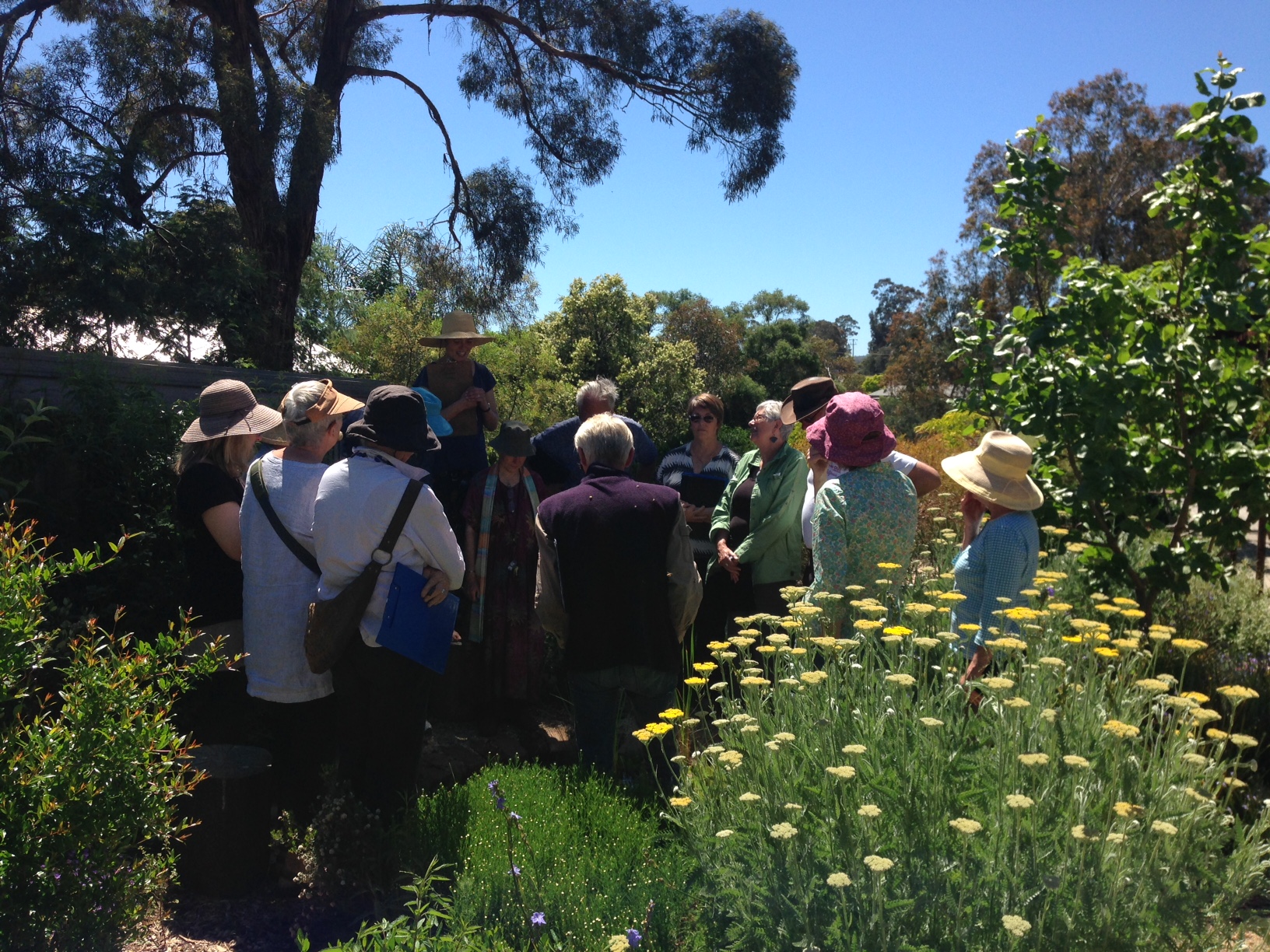
Cassia’s pond has Pobblebonk tadpoles but no mosquito larvae because she’s introduced native Murray Rainbow Fish that eat wrigglers but not frogs eggs.
- Growing indigenous and exotic flowers for native pollinators such as native bees, wasps, hoverflies and butterflies. Through extending the flowering season with thoughtful planting you can extend the time nectar and pollen are available to pollinators;
- Planting dense and prickly shrubs where small bush birds can hide from cats and aggressive or predatory birds;
- Building leaf litter, mulch and woody debris for insect habitat, which in turn provide food for ground foraging birds, reptiles, frogs and phascogales;
- Adding nest-boxes and artificial hollows to trees for birds and bats – but watch out they aren’t placed too high or you won’t be able to evict Indian Miners and other wanted pests;
- Planting a drought-tolerant native lawn that provides food and shelter for moth and butterfly larvae, and seed for native pigeons and Diamond Firetails;
- Creating varied rocky habitats for basking lizards, including rock on soil and rock on rock. Also, pupae from ant colonies that live under the rocks are an important food source for ground foraging predators.
The workshop concluded in the shade of a gum tree, with an exercise and conversation about nudging our own gardens for wildlife. What more could we do and what were our barriers? Cassia guided participants to think about their gardens in terms of management zones, from high maintenance and input zones such as the small orchard, to low maintenance and input zones such as areas of drought-hardy, native shrubs planted for screening at the front of a block.
Thanks to all attendees for coming along, and to Cassia and Melanie Marshall from the Mount Alexander Shire Council for their work presenting and bringing this event into fruition. Much was learned from Cassia’s unique perspective on how to build a garden and engage with nature.
For further information visit our Wildlife Friendly Garden webpage here.
This workshop has been supported by Connecting Country, through funding from the Australian Government and the Mount Alexander Shire Council through their Sustainable Living Workshop Series.
2017 intake for CALM courses at Bendigo TAFE
Posted on 24 November, 2016 by Connecting Country
 Bendigo Tafe is again calling for expressions of interest in the 2017 intake for Certificate III, IV and Diploma of Conservation and Land Management. If you are reasonably fit, want to learn more about the environment and enjoy being outdoors this may be the course for you.
Bendigo Tafe is again calling for expressions of interest in the 2017 intake for Certificate III, IV and Diploma of Conservation and Land Management. If you are reasonably fit, want to learn more about the environment and enjoy being outdoors this may be the course for you.
Current graduates are employed by places such as Connecting Country, DELWP, NCCMA, Local Contractors, Councils and Conservation Volunteers Australia. There are no pre-requisites for any levels.
Certificate III – gain skill sets – pathways to further study or employment
- Farm Chemical Users Certificate
- Chainsaws
- Fencing
- Revegetation
- Water quality, macro-invertebrate survey and animal identification skills
- Introduction to Native Flora
- Weed and Pest management
- Multiple field trips
- Camps where applicable
Certificate IV – gain knowledge – pathways to further study or employment
- Native Flora and Fauna ID
- Survey methodology
- Farm Chemicals Users Certificate
- Revegetation
- Mapping
- Pest Management
- OHS
- Project Costing
- Environmental Policies and Legislation
- Multiple camps and field trips
Diploma – It is advised that students have completed the Certificate IV or have extensive environmental background – pathway to further study or employment
- Research
- Planning River restoration
- Whole Farm Planning
- Conduct Biological Surveys
- Advanced Flora ID
- Creating Management Plans
- Environmental Legislation
- Creating Funding Bids
- Management of Weed and Pest Planning
- Management of Alpine, Woodland and Coastal Parks
- Multiple camps and field trips
For more information you can go to the Bendigo Tafe website and put in an enquiry/online application or contact Terri Williams, Coordinator of Conservation and Land Management, twilliams@bendigotafe.edu.au (03) 5434 1743.
Talking Fire – Igniting a Spark
Posted on 24 November, 2016 by Connecting Country
There’s a triangle involved in fire; which involves conditions, substrate and spark. The “Talking Fire” weekend on 12-13th November 2016 lit a spark, but it certainly wasn’t damaging. The triangle of local, Indigenous and technical expertise, field and forest visits, and space to talk about what people in the Newstead-Maldon community have heard and seen, all created another sort of ignition.

Part of the field trip convoy through the Muckleford Forest looking at ecological values, burning and fire recovery
People are concerned about the places they love, including home and the local landscape more generally. Talking Fire was a great start to a new kind of conversation: about learning, reducing fear, building understanding, caring for our towns, settlements and the whole landscape together.
Thanks to everyone who participated and contributed. Especially Maldon Urban Landcare Group (MULGA). And for funding – thanks to Mount Alexander Shire Community Grants, Maldon and District Community Bank (Bendigo Bank), Norman Wettenhall Foundation. For catering – Newstead Primary School, Newstead Mens’ Shed; for gifts – Goughs Range Olives and Newstead Natives; in-kind support – Newstead Landcare, Connecting Country, Newstead Fire Brigade, Newstead Auxiliary, Friends of Box Ironbark Forests, Bendigo TAFE, DELWP. And our recorders – Julie Hough, Julie Millowick, Christine Sayer, Marion Williams, Simon Beckett, Andrew Skeoch, Sarah Koschak, Gordon Dowell. And three cheers for the planning group too.

Andrew Bennett (wildlife and landscape ecologist, La Trobe University and Arthur Rylah Institute for Environmental Research), Sam Strong (pHD candidate at Charles Sturt University), Joan Sartori (Newstead CFA Auxiliary), Mick Burke and Trent Nelson (Dja Dja Wurrung Clans)
And mostly, to everyone who came to any of it, or all, and joined the chat. Talking Fire think there were around 40 – 50 on each day, and not the same attendees, or speakers. It made for more conversations.
Because many people couldn’t attend the event, or only came to parts of it, Talking Fire are curating the audio, visual and audio-visual of the weekend at their website www.talkingfire.org. You will be able to get a gist of the conversations there. But please be a bit patient for it all to arrive.
Talking Fire are also interested in collecting ‘fire histories’ around the CFA auxiliary, and other fire experiences – to share and learn from. Contact Gordon 0467 586 881 or Janet 0439 003 469.
More info: www.talkingfire.org or Chris 54762457.
South African Weed Orchid – ID first, then dig out!
Posted on 23 November, 2016 by Connecting Country
South African Weed Orchid, Disa bracteata, is flowering now and if you’re quick you can help stop the spread of this emerging and highly invasive weed in our area. Tanya recently found them at Barkers Creek Reservoir in Harcourt and we have some photos to help you identify them. And, if you do find them, practice good bush hygiene so that you don’t spread the infestation.
South African Weed Orchid is a perennial terrestrial orchid with underground tubers. Dormant for much of the year, it sprouts in early spring with a rosette of leaves, followed by flower spikes developing into seeds as the weather drys out during summer.
Stems – erect and fleshy usually 30–50 cm tall. Leaves – a rosette of green leaves with purple undersides, tapering from a broad base to an pointy tip, 5–15 cm long. These weeds are distinct from indigenous Onion Orchids (Microtis spp.) as they have a rosette of leaves, while the native Onion Orchids have one round leaf, often extending above the flower spike.
Flowers – from late October through to December in Victoria. 15– 30 flowers grow on a thick cylindrical spike 5–20 cm long, which resembles a greenish-brown asparagus spear. Flowers very dense and are mostly reddish-brown and yellow with a leafy bract.
Seeds – black, minute and dust-like, contained within the capsular fruit. The species is autogamous (self-pollinating) and thus produces

Treatment by digging out and carefully bagging plant matter is useful in containing the spread of this invasive weed. Photo: Bonnie Humphreys
a large amount of seed per plant. The main form of dispersal is wind, but seed can also be spread on shoes, clothing and vehicles, as well as in water and through animal and soil movement. The seeds can remain viable for years. (This means that one seeding plant this year means many weeds for many, many years to come.) Seed set and dispersal starts at the end of November or as the weather drys out. The seeds continue to mature even if the flower head is picked.
Tubers – generally thought to have 1–3 tubers, similar in appearance to a small potato, about 20 mm in size. The plant also has a mass of fleshy roots and there is no main tap root.

The weed orchid has 1–3 tubers about 20 mm in size also has a mass of fleshy roots and there is no main tap root. Photo: Bonnie Humphreys
Treatment – Manual removal requires digging up and removing all parts of the plant, including the tuber, leaves and flowers. The plant material must be bagged securely (e.g., in a snap-lock bag) to prevent the fine dust-like seed from spreading further.
Currently this weed has been recorded in relatively small numbers in Chewton, Redesdale, Elphinstone, Taradale, Walmer, Barkers Creek, Sutton Grange, Ravenswood and Harcourt.
For further reading see this link for more information and reading references see page 6 of this 2009 edition of Weedscene magazine.
Fantails and Button-quails on the Metcalfe Bird Walk
Posted on 23 November, 2016 by Tanya Loos
On the 6th of November 2016, Connecting Country’s monthly bird walk was at Metcalfe Nature Conservation Reserve, or “the Common”. We met at the Metcalfe Hall, and some twenty of us were delighted to hear that locals, Brian and Kate Hamond, had something special they wished to share.
A large roll of wire in the Hamond’s open shed proved an excellent nesting spot for a pair of Grey Fantails. As we all gathered around, binoculars in hand, we were delighted to observe the pair swap over egg brooding duties. They seemed unconcerned by our presence, and Brian said he has been able to go about his usual business in the shed without disturbing the fantails. Many thanks to Brian and Kate for this exciting start to the morning.
We set off to the Common and the excitement continued – for the moment Greg Waddell opened the car door, we were stunned to get very good views of a small quail-like species as it walked and then flew away into the woodland. A rather technical discussion of Button-quail identification followed using a couple of bird books. We decided that the Pizzey and Knight field guide is most useful in these situations, as it has the key identifying feature in italics. It was agreed that the bird was a Little Button-quail, rather than the more common Painted Button-quail. Little Button-quails are being seen increasingly in Eastern Australia after these record-breaking rains and – although rarely seen – they are on our local bird-checklist-for-the-mount-alexander-region.
The highlight birds seen along the Ridge Track were probably the Rufous Whistlers, calling incessantly from the canopy. A quiet spot that morning, we saw just 13 species along the track. The wildflowers were stunning however – thick masses of flowering Chocolate Lilies and Yam Daisies.
We traveled around the Goldfields Rd to the more lush areas on the lower slopes of the Reserve, and did a Twenty Minute 2 Hectare count as we walked up the slope and we saw 9 species. The birds were a bit hard to see due to the lush and abundant growth on the Yellow Box and Grey Box. Again, the wildflowers were a treat- with Chocolate Lilies and Bulbine Lilies in huge drifts. Thanks to Maeve for being our scribe.
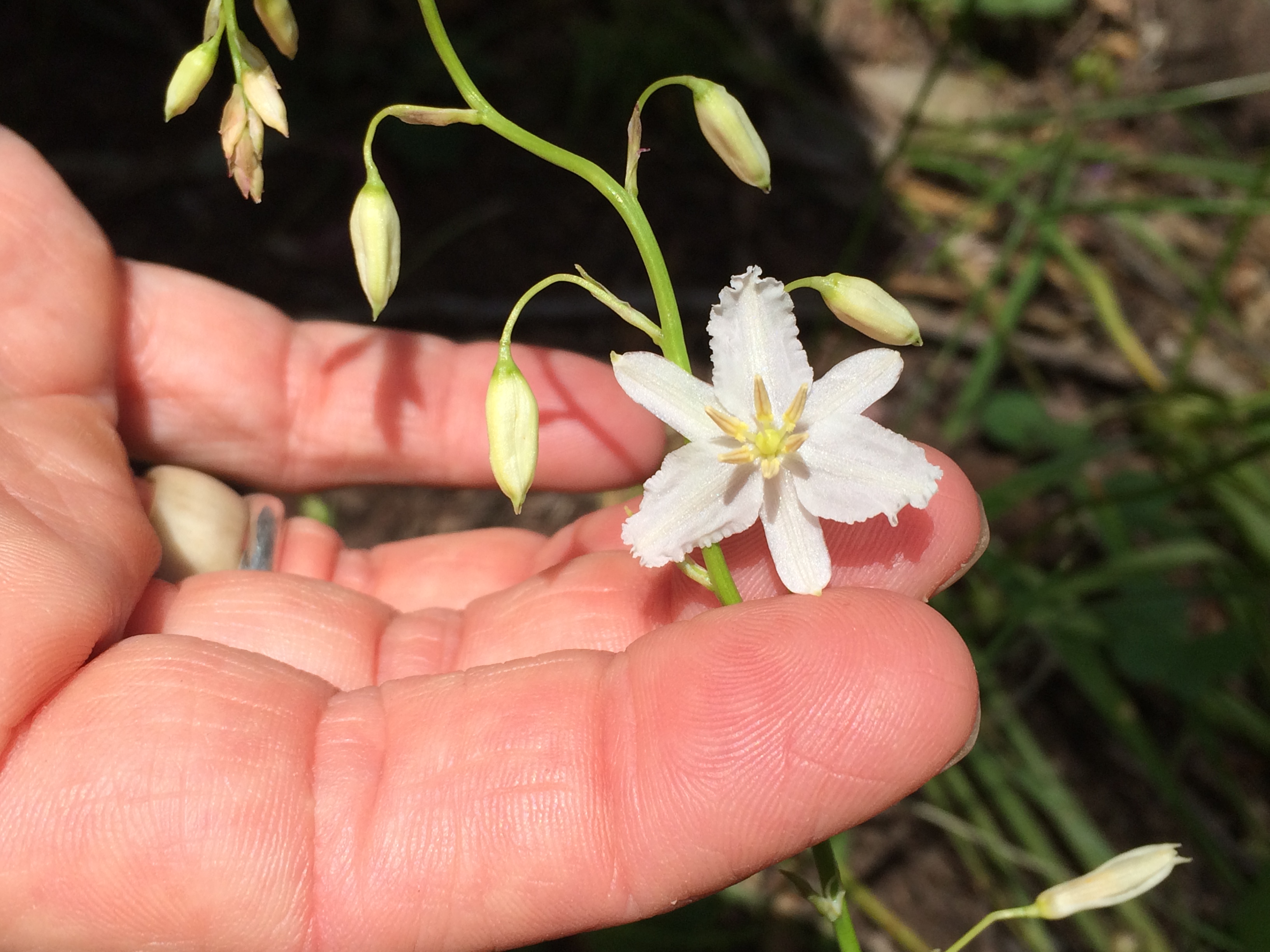 We also saw a white form of Chocolate lily! This is not an albino – just a colour variation. You may have noticed some white forms yourself – such as Wax-lip Orchids, and also more recently, Bluebells (Wahlenbergia).
We also saw a white form of Chocolate lily! This is not an albino – just a colour variation. You may have noticed some white forms yourself – such as Wax-lip Orchids, and also more recently, Bluebells (Wahlenbergia).
Our Bird Walks usually finish up at about 11:30am, but this time we travelled back to the Metcalfe Hall and I gave a short Powerpoint presentation on the birds of the Metcalfe area.
It was a very enjoyable morning, and I would like to thank Debbie Farmer, Secretary of Metcalfe Landcare, for organising the Hall and publicising the event locally. It was fantastic to have some beginner birdwatchers there!
Vale Ern Perkins
Posted on 21 November, 2016 by Connecting Country
The Connecting Country community is deeply saddened to learn of the recent passing of Ern Perkins. Along with wife Lesley, Ern’s efforts to discover and document the flora and fauna of Castlemaine and surrounds over a period of more than 40 years are legendary. The findings of this research have formed the basis for so much of our knowledge about the local environment. He was passionate about making this information available to the general public. Ern mentored many local ecologists, and was a great believer in using rigorous scientific survey methods. He was a great supporter of Connecting Country, and regularly provided advice on plant species identification and occurrence. He was also involved in many other local groups including Friends of Kaweka, Castlemaine Field Naturalists Club, FOBIF and Castlemaine Landcare.
It would be a monumental task to list all that he has achieved, but some of the highlights include:
- Co-authorship of the ‘Eucalypts of the Mount Alexander Region’, launched by FOBIF only a couple of months ago (click here for more info)
- Development of the comprehensive ‘Wild Plants of Castlemaine’ interactive guide, and subsequent free distribution to the local community and Landcare groups (again, only in the past couple of months was this released)
- Long-term maintenance of the list of plants of Castlemaine district, which has been the most valuable document on the shelves of many local botanists
- Monthly 20-minute, 2-hectare bird surveys at more than 15 locations for a period of more than 10 years
- Coordinating hundreds of repeated plant surveys at burnt and unburnt woodland plots within local bushlands
- Development of the Grass Identification Guide CD for the local area
- Maintenance of the Photopoint Project for the local area
- Development and maintenance of many brochures on the identification of plants and animals of the local area, as well as brochures on local sites to visit. Many of these brochures are available at the Market Building and Goldfields Library.
- Dozens (if not hundreds) of articles published in the Castlemaine Naturalist newsletter.
He was awarded an OAM in 2000 for Services to Conservation. In 2008, Ern was awarded the Australian Natural History Medallion, which is awarded annually to the person judged to have made the most meritorious contribution to the understanding of Australian Natural History. In late 2015, his local contribution was recognised with life membership of the Castlemaine Field Naturalists Club. He is an inspiration to the staff of Connecting Country.
We send our condolences to Lesley and family. He has established a legacy that everyone with an interest in the local environment will need to work together to continue. (Follow these links to read messages from the Castlemaine Field Naturalists Club and Castlemaine Landcare – as published in the Castlemaine Mail newspaper on 11 Nov 2016).
Vale Ern Perkins.
Lions? We don’t have lions, but we do have Antlions!
Posted on 17 November, 2016 by Connecting Country
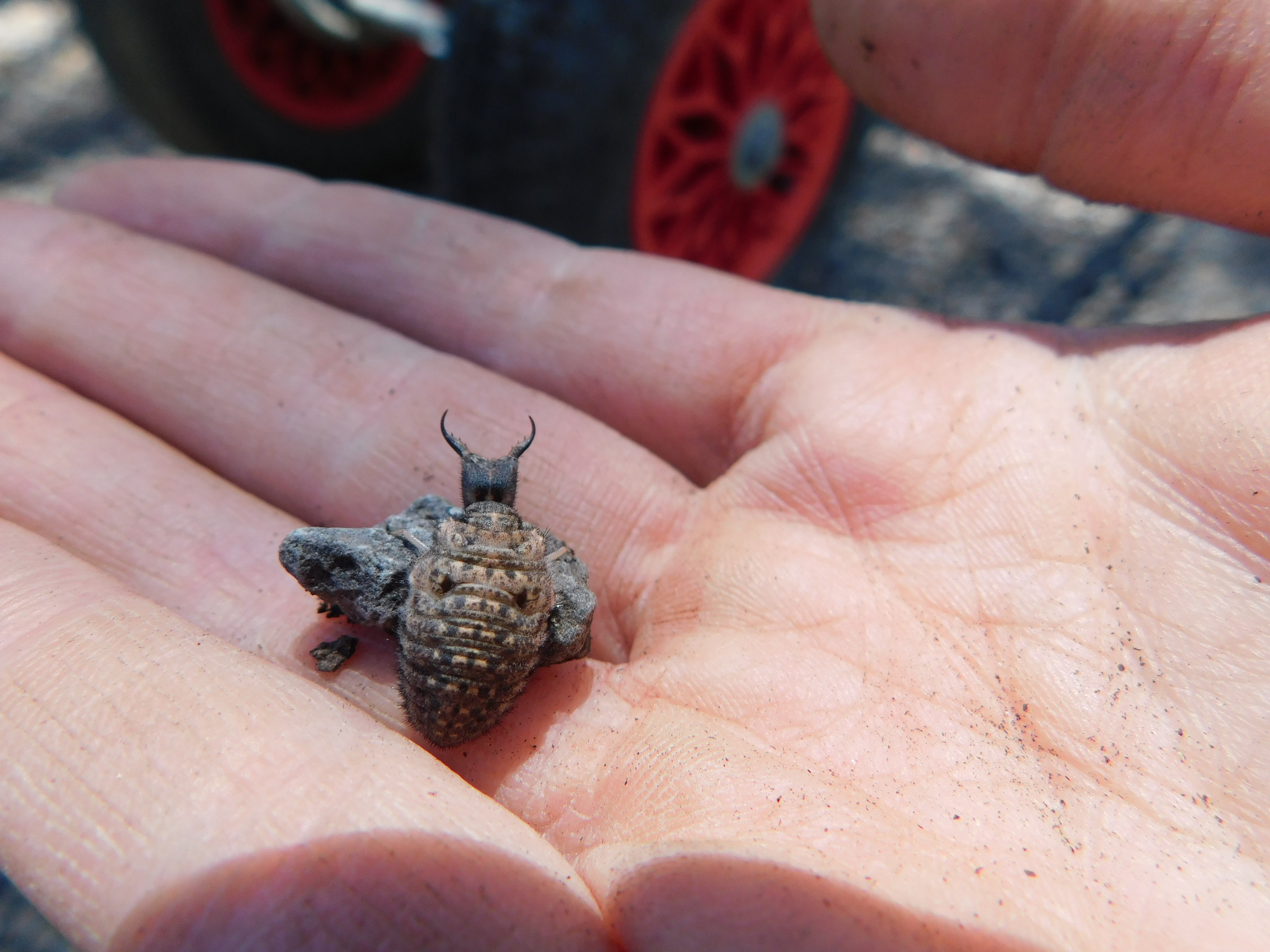 Connecting Country’s field botanist, Bonnie Humphreys, came across an interesting creature this week while out in the field conducting vegetation surveys and finding her way around her new camera. Upon return to the office, Bonnie did some hunting around to see what it was that she had captured with her camera. Turns out it is an antlion, but the species remains unknown. Perhaps one of our readers could help us identify it?
Connecting Country’s field botanist, Bonnie Humphreys, came across an interesting creature this week while out in the field conducting vegetation surveys and finding her way around her new camera. Upon return to the office, Bonnie did some hunting around to see what it was that she had captured with her camera. Turns out it is an antlion, but the species remains unknown. Perhaps one of our readers could help us identify it?
The antlions are a group of about 2,000 species of insect in the family Myrmeleontidae, known for the fiercely predatory habits of their larvae, which in many species dig pits to trap passing ants or other prey.
The sand traps are about 40mm diameter. The Antlion sit at the middle of the trap, covered by loose sands. When an ant or other small insects walks inside the trap, some sand falls into the centre to alert the Antlion. It flicks more sand to the ant and cause the ‘land sliding’. The ant then falls towards the centre and the Antlion attacks the ant by its long jaws. Some other species larva burrow freely in sand or live on trees as predators. They pupate in soil with cocoon covered with sand. Eggs are laid singly and scattered in dry soil. You can watch another species of antlion in action here.
If you do recognise the species we’d love to hear from you, please leave a comment below.
Wednesday 30th November – Soils workshop with Katie Finlay and NCCMA
Posted on 14 November, 2016 by Connecting Country
 Following on from our Farm Field Day in August, Connecting Country is working with North Central Catchment Management Authority (NCCMA) to run a short workshop about soils in Harcourt.
Following on from our Farm Field Day in August, Connecting Country is working with North Central Catchment Management Authority (NCCMA) to run a short workshop about soils in Harcourt.
During this workshop participants will hear from Katie Finlay from Mt Alexander Fruit Gardens about their property and the role soil health plays in their farming system. Practical instruction from Mandy Coulson (NCCMA) and soil scientist Rebecca Mitchell will take participants through a series of soil tests in the recently launched Soil Health Guide to measure health on your land.
If you’d like to come along, the free workshop will run from 10 – 11.30am on Wednesday November 30th 2016.
To reserve your place at this event, please follow this link: https://www.trybooking.com/241695.
For more information contact Naomi on 5472 1594 or email naomi@connectingcountry.org.au.
Tarrangower Cactus Control Group nominated for Parks Vic award – vote for them!
Posted on 10 November, 2016 by Connecting Country
The Tarrangower Cactus Control Group has let Connecting Country know that they have been nominated for Parks Victoria’s Kookaburra Public Choice Award. You, your family and friends can support the Cactus Warriors by voting for them.
You can go direct to the voting form through this link: https://www.surveymonkey.com/r/publicchoiceaward
If you would like to read more about the award and those who have been nominated before you vote please use this link: http://parkweb.vic.gov.au/get-involved/volunteer/kookaburra
Voting closes on 30 November 2016. Let them know you care!
Call for photos from Friends of the Box Ironbark Forests
Posted on 9 November, 2016 by Connecting Country
The theme of the next FOBIF photo exhibition is “Mountains and Waterways”.
Togs Cafe in Castlemaine will host the next FOBIF photo exhibition in November 2017. FOBIF are now calling for your favourite photo/s of;
- Mount Alexander, Mount Tarrengower or other mountain in Mount Alexander region (you can include photos of the mountains and flora and fauna on the mountains); and/or
- Waterways such as creeks, rivers, dams, Expedition Pass, Bells Swamp, Cairn Curran or the Moorlort Wetlands.
There is also plenty of time to take new photos; the closing date for the submission of photos is not till 1 October 2017. FOBIF are telling people well in advance of the exhibition as this years heavy winter and spring rains means now is a perfect time now to take waterways photos.
They will place all photos they receive in a designated album on the FOBIF Flickr site as long as they fall within the guidelines. A FOBIF sub-committee will then select approximately 18 photos to be printed and framed for the exhibition. If your photo is selected, as well as being included in the exhibition, you will receive a free framed copy of your photo.
Guidelines
- Photo to include Mountains or Waterways within the Mount Alexander region and including Moolort Plains.
- Email photos to info@fobif.org.au – at this stage only send files under 1 mg. A small file size is fine for Flickr but the photo will need to be at least 3 mg to be printed and included in the exhibitions.
- Include the photo’s location, date, plus identification of flora and fauna.
- Photos can be closeups, landscapes as well as photos where flora and fauna associated with mountains and waterways are the main feature.
They have already set up the Mountains and Waterways album so you can get an idea of the range of photos that fall within the guidelines.
Contact Bronwyn Silver at info@fobif.org.au or 5475 1089 for further information.
Stilts, tuans and Swifty make for a great Connecting Country float!
Posted on 9 November, 2016 by Connecting Country

An enthusiastic mob of kids and adults turned out to show their support for Connecting Country last Friday night at the Castlemaine Show Parade
Twenty people volunteered to walk the main street of Castlemaine proudly showing their support for Connecting Country on the evening of Friday 28th October. We were lucky to have an appearance by Swifty the parrot and a resident tuan along for the float as well as Ella with her amazing stilt walking ability for all to see.
This fun event aimed to promote the work that Connecting Country does in our local area to the broader community of Castlemaine. Volunteers in high-vis also gave out hedge wattle seeds, caramello koalas and eucalyptus lollies to the happy and supportive crowd.
A big thank-you to Bonnie for donating the wattle seed, Jarrod for driving the red ute, Beth, Ella and Micah for dressing up and everyone else for volunteering their time and enthusiasm for Connecting Country.

Our resident tuan and Theo enjoy the afternoon sunshine on the direct seeder before they head down the street.
Little Habitat Heroes campaign reaches $2000!
Posted on 7 November, 2016 by Connecting Country
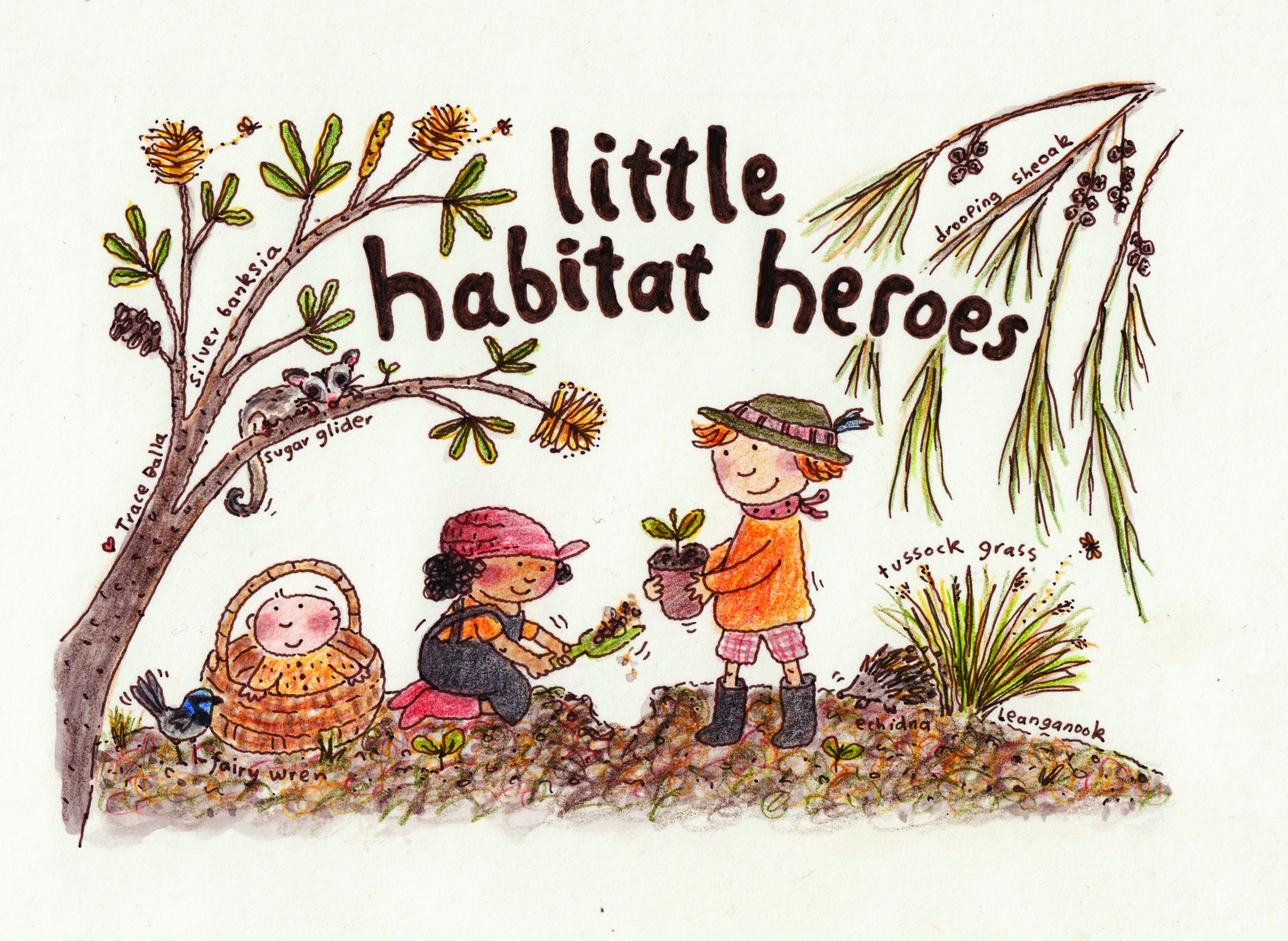 Connecting Country is proud to be supporting the Little Habitat Heroes in their campaign to raise funds for landscape restoration at the former silkworm farm site on Mount Alexander. They have raised just over $2,000 already and are keen to raise at least $3,000 to cover the costs of plants, guards, and a community planting day in 2017.
Connecting Country is proud to be supporting the Little Habitat Heroes in their campaign to raise funds for landscape restoration at the former silkworm farm site on Mount Alexander. They have raised just over $2,000 already and are keen to raise at least $3,000 to cover the costs of plants, guards, and a community planting day in 2017.
This project was born by a group of new mums who met at a Mothers Group in Castlemaine in early 2016. They shared a dream to create something unique for their babies’ first birthdays and wanted to contribute to the restoration of the local environment and give their children the gift of a personal connection with nature.
For more information about this project see our previous blog post.
Visit: www.littlehabitatheroes.org, or their facebook page or donate via Give Now. A huge thanks to all of those who have already donated.


